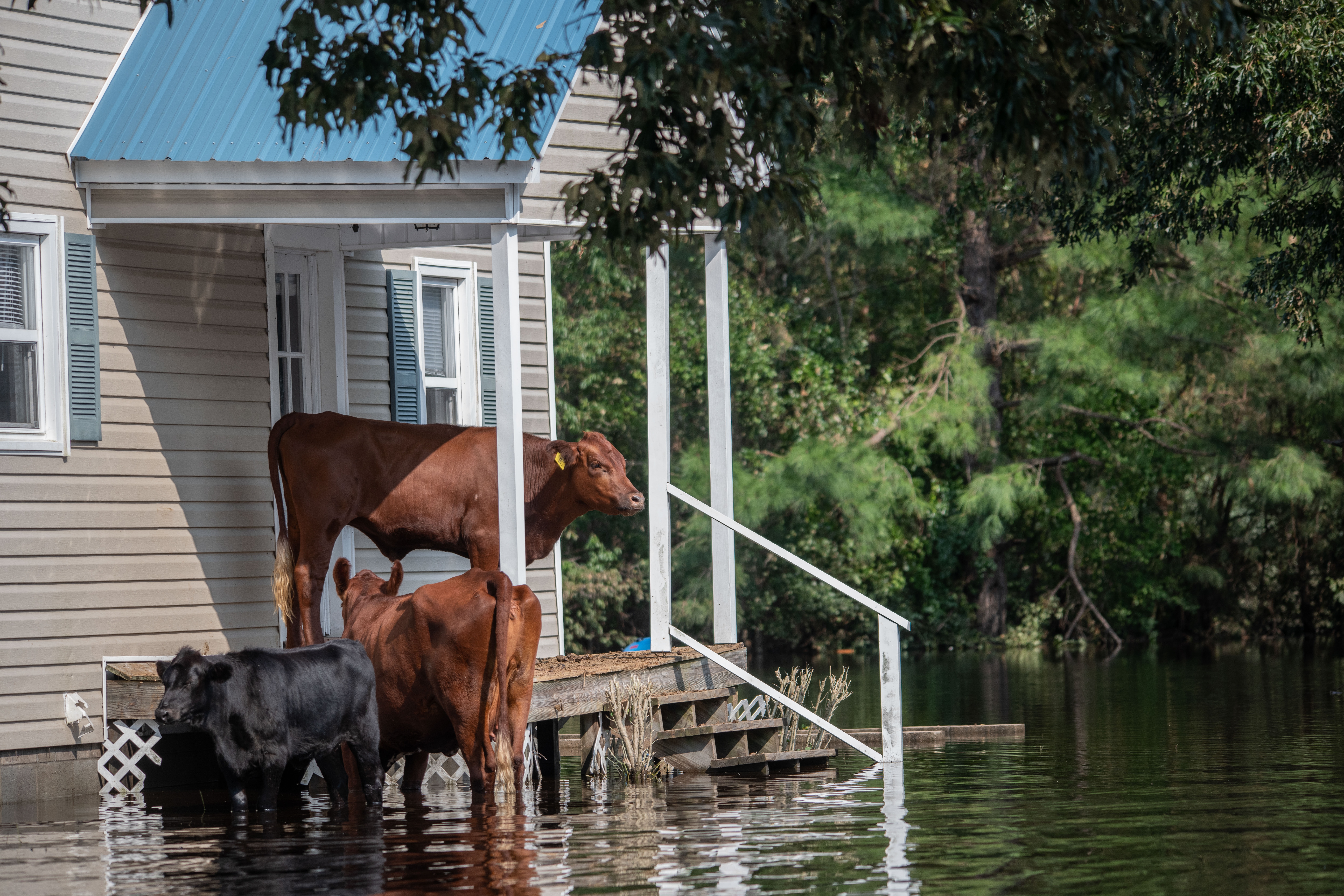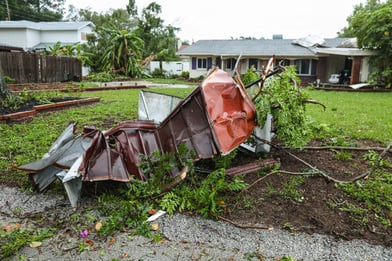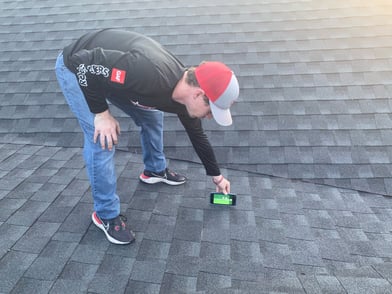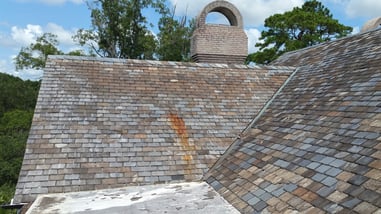
In the weeks following a hurricane, many of us are left in a daze. For those of us who lost something, this daze isn’t something we want to wake up from. For those of us who lost everything, this daze is our only saving grace to keep us from going insane. Although we wish this hazy state could last forever, there’s a fateful moment when it lifts and reality sets in. Your roof is damaged beyond repair, and that non-renewal notice you received in the mail last week is nowhere to be found. What happens now? Will my insurance company still help me repair my roof? What am I supposed to do?
At RoofCrafters, all of your concerns resonate with us. Based in the Southeast, we’ve seen our fair share of hurricanes, and we’ve been blessed with the opportunity to help homeowners like you for the past 30 years with hurricane relief efforts. If there’s one thing we know for sure, it’s that panicking about the unknown or the future won’t help anyone or anything, especially not your roof. So, let’s go over what we do know.
If you’re reading this article, you’re probably curious about why non-renewal notices have been put on hold post-Hurricane Ian, and you’re wondering what this means for your roof. It’s a good thing you’re here because in this article I’ll be breaking down what that non-renewal notice means, how Hurricane Ian affected non-renewal notices, why you may have received one in the mail before the storm, and how to proceed in the future. Let’s get started, shall we?
What is a Non-Renewal Notice?
First and foremost, what exactly is a non-renewal notice? If you’ve received a non-renewal notice, it’s essentially a statement from your homeowner’s insurance carrier that they do not intend on offering you a chance to renew your policy after the current one expires. In recent months, Florida’s property insurance market has been chaotically shifting, and many insurers have been issuing non-renewals to loyal homeowners like you.
Typically, if an insurer does send out a non-renewal notice, they’re usually required to do so at least 30 days before the expiration of the homeowner's coverage, unless you’ve missed a payment or committed fraud on your application. However, Florida homeowners have been seeing a common theme in receiving their non-renewal notices 120 days in advance to the end of their coverage period, depending on the insurer.
If you’ve received a non-renewal notice recently and believe you have been wrongly denied, don’t lose all hope just yet. You can attempt to contest the non-renewal, although in this case, you’ll more than likely need to prove that your home is not in a high-risk area, which is difficult when living in hurricane-prone areas of Florida.
How Hurricane Ian Affected Non-Renewal Notices
Hurricane Ian made landfall in the Sunshine State on September 28th, 2022, in the Fort Meyers area as a category 4 hurricane, wreaking havoc throughout the city. The fierce 150-mph winds pushed multiple feet of water ashore from the Gulf of Mexico which would ultimately tear through homes and businesses along the coast. On the following day, Ian trekked through the state and onto the Florida Peninsula, making sure to dump flooding rains and torturous winds on the interior while strengthening a storm surge that would then make landfall on the opposite coast.

Within the following days, the waters would calm and the sky would open up, and the toll of Hurricane Ian would begin to sink in. More than 2,500 rescues were made, but sadly the death toll from Hurricane Ian tallied up to just over 100. Needless to say, morale was incredibly low in the following weeks from the storm. Many people had irreparable damage to their homes, and others lost everything. Many of these folks had received non-renewal notices just weeks before the storm, so what does this mean now? Is all completely lost?
If you’ve received a non-renewal notice letter in the mail before the hurricane, sadly you’re bound to receive another one after a brief 2-month pause. According to the order passed by Insurance Commissioner David Altamaier on Wednesday, September 28th, “Between September 28, 2022, and November 28, 2022, no insurer or other entity regulated under the Florida Insurance Code shall cancel or non-renew, or issue a notice of cancellation or nonrenewal of a policy or contract of insurance covering a property or risk in Florida, except at the written request or written concurrence of the policyholder.”
An important thing to note is that this order will also temporarily shield homeowners from losing their policies if their properties were damaged in the storm. Under the order, insurers will be prohibited from canceling/non-renewing policies for up to 90 days after the property has been repaired. Although this conversation seems unfair and unjust after such a devastating event, it’s a conversation that must be had for you and your family to remain diligent.
Why Would I Receive a Non-Renewal Notice?
So, why exactly did you receive a non-renewal notice before the storm? There are several different reasons, however the most common among homeowners across the state of Florida include:
- Failed roof inspection
- Risk management
- Age and condition of your roof
Failed Roof Inspection
 Roof inspections provide homeowners with the opportunity to fix problems before they’re out of control, such as a small leak, or brittle shingles, so that they’re able to maintain their insurance policies. When these changes aren’t made, and the homeowner deliberately lets the functionality of their roof decline, the insurer oftentimes has no other choice but to revoke their policy for future coverage.
Roof inspections provide homeowners with the opportunity to fix problems before they’re out of control, such as a small leak, or brittle shingles, so that they’re able to maintain their insurance policies. When these changes aren’t made, and the homeowner deliberately lets the functionality of their roof decline, the insurer oftentimes has no other choice but to revoke their policy for future coverage.
Risk Management
If the reason your policy isn’t renewed is due to risk management, or “catastrophic risk exposure”, this essentially means that your current carrier has decided that insuring your home is no longer profitable - the risk is too high. Although this seems unfair, it’s sadly a legitimate reason you could’ve received a non-renewal notice. The acts of Mother Nature are not your responsibility nor your fault, but when an insurance company bites off more than it can chew and become over-extended throughout Florida, they sometimes decide to lower their policy count. Guess who gets cut first? That’s right, those homes that dwell in high-risk areas.
Age and Condition of Roof
 Within the past few months, insurance carriers in Florida have become extremely meticulous when it comes to the ages and conditions of the roofs they cover, and many of these carriers have even tightened their guidelines. Some carriers have an age-triggered non-renewal, which in most cases seems to be set at 15 years. If your roof is 15 years or older, that may be a reason why you’ve received a non-renewal notice.
Within the past few months, insurance carriers in Florida have become extremely meticulous when it comes to the ages and conditions of the roofs they cover, and many of these carriers have even tightened their guidelines. Some carriers have an age-triggered non-renewal, which in most cases seems to be set at 15 years. If your roof is 15 years or older, that may be a reason why you’ve received a non-renewal notice.
Will I Receive Another Non-Renewal Notice Once the Order Lifts?
It’s more than likely. However, please know that receiving a non-renewal notice is not the end of the world. It’s alarming and disconcerting, especially after a ferocious hurricane, but it’s not a reason to panic. Knowledge is power, so as long as you read the fine print, understand why your policy will not be renewed, and reach out to the proper personnel to help you handle the process, you’ll be just fine.
If you’ve received a non-renewal notice due to a roofing-related issue that can be resolved with a repair or replacement, schedule an inspection with RoofCrafters as soon as possible. RoofCrafters is a GAF-certified contractor, and are among the 2% of Master Elite contractors nationwide. Being a Master Elite Certified contractor means that we offer elite warranties, too. Depending on the choice of material, GAF warranties last anywhere from 20-50 years, and in some cases up to a lifetime.
Drop RoofCrafters a line and we’ll hook you up with the most sought-after roofing warranties in the industry, and make sure you avoid receiving a non-renewal notice before the lifespan of your roof has come to an end ever again. In the meantime, be sure to browse through the extensive resources located in our learning center. I recommend reading, “Senate Bill 76: Effects on Homeowners and The Roofing Industry” so that you can better understand the recent changes made to roofing laws in your state.
My name is Kevin Mills, and I am the lead estimator for RoofCrafters’ Tampa division. I’m originally from Michigan, and I enjoy hunting, fishing, and spending any free time outdoors. What I’m most passionate about, though, is helping business owners and homeowners alike achieve their roofing goals, all while providing a seamless customer journey.


